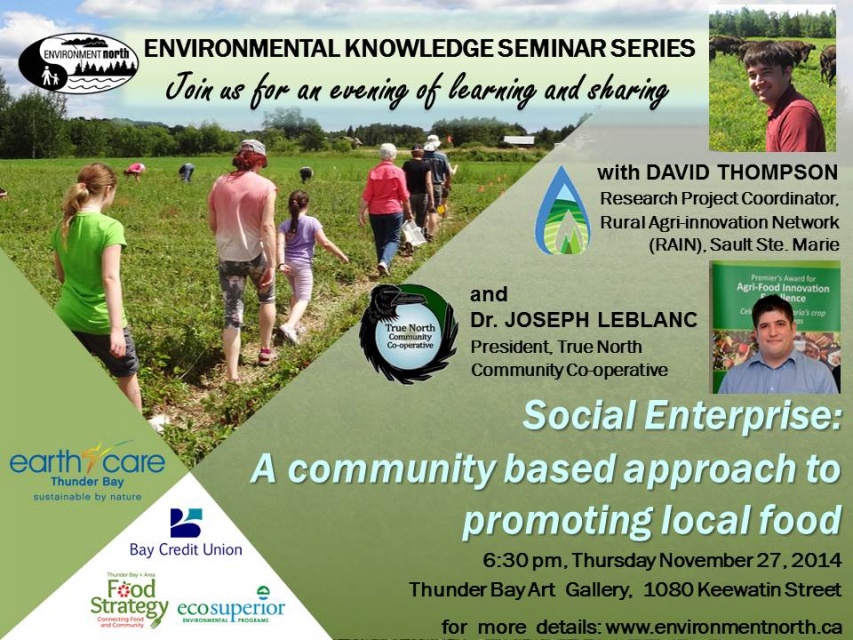Social Enterprise
A community-based approach to promoting local food

Environment North's fifth Environmental Knowledge Learning and Sharing Seminar took place on November 27, 2014. Click here for poster pdf Guest speakers were David Thompson, the Research Project Coordinator at Rural Agri-innovation Network (RAIN) in Sault Ste. Marie. Click here to visit the RAIN website and Dr. Joseph LeBlanc, president of the True North Community Co-operative (TNCC) board of directors. Click here to visit TNCC.
Local Food a Significant Choice
Environment North board member Roopa Rakshit's article on Local Food was originally published in the Chronicle Journal on Tuesday November 25, 2014.
The growing season is over for 2014. It may not have been the best year for growing basil but it has been an important year for progress on local food initiatives.
Just one year ago, the Ontario Legislature passed the Local Food Act, the first of its kind in Canada. The purpose of this act is to make local food more available and continue to expand Ontario’s agri-food sector. Initiatives supported by the legislation include increasing local food awareness, setting local food targets in consultation with sector partners and offering a non-refundable tax credit to farmers who donate their surplus harvest to eligible community food programs.
This summer the “Thunder Bay and Area Food Strategy” was endorsed by The City of Thunder Bay and many surrounding municipalities. The goal is to create a healthy, equitable, and sustainable food system that contributes to the economic, ecological, health, and social well-being of the City of Thunder Bay and Area. One of the network’s recent activities was an all-candidate survey on local food issues.
Just last month the report “Beyond the Fields: The Importance of Forest and Freshwater foods in Northern Ontario” was released. This report was a joint undertaking of Ontario Nature, the True North Community Co-operative and Environment North. The report is part of Forage North, an Ontario Nature project that received funding from the Ontario Local Food Fund.
The Thunder Bay District Health Unit and Food Action Network has published their seventh annual local food guide “Get Fresh Thunder Bay” and are involved in programs that support local food and food security such as community gardens.
Increasingly more locally grown food is seen on grocery store shelves, restaurant menus, institutional cafeterias and kitchen tables. Public demand for local food is creating social platforms that are providing favourable markets for entrepreneurs to capitalize on, and providing new opportunities. The benefits from local food initiatives, such as improving local economies, resiliency, food security, community cohesion, health and environment are experienced both by the community at large as well as by individuals. There is potential for more. Supporting the local food movement is a significant and important choice for each of us to take.
Environment North’s fifth environmental learning and sharing seminar is titled Social Enterprise: A community-based approach to promoting local food. The guest speakers, Mr. David Thompson and Dr. Joseph LeBlanc are very familiar with social enterprises, organizations which utilize commercial strategies to improve the well-being of people and the environment.
Mr. David Thompson is the research project coordinator from the Algoma Rural Agri-Innovation Network (RAIN). RAIN undertakes research focused on the needs of local farmers, holds practical workshops and assists with market development. They also share information with other northern districts. Mr. Thompson has an MBA in Community Economic Development from Cape Breton University also serves on the Advisory Council for Sustain Ontario.
Dr. Joseph Le Blanc is a project coordinator with Food Secure Canada and he is also an advisory council member of Sustain Ontario. Dr. LeBlanc is the current president of Thunder Bay’s True North Community Co-operative. The co-operative provides both an opportunity for regional producers to market their goods and for Northern Ontarians to access regionally produced foods and handcrafts. Dr. LeBlanc obtained is PhD in Forest Sciences from Lakehead University.
Seminar discussion will revolve around the intimate links of the local food system to places where food is grown, processed and marketed and where food is eaten – as well as the links to the people associated with those places. The speakers will share their insights and experiences on enhancing the local food movement as a viable market for socio-economic and environmental benefits. The seminar will provide a platform to share the dynamics and challenges behind what makes a strong local and regional food system that can deliver economic benefits, reduce environmental impacts, and increase food access.
Everyone is cordially invited to the seminar scheduled on Thursday, 27 November 2014, 6:30 p.m. at the Thunder Bay Art Gallery. For this seminar, Environment North is pleased to be partnering with EarthCare Thunder Bay, Bay Credit Union, EcoSuperior and the Thunder Bay and Area Food Strategy Network. Visit environmentnorth.ca for more details. Roopa Rakshit is a board member of Environment North.
